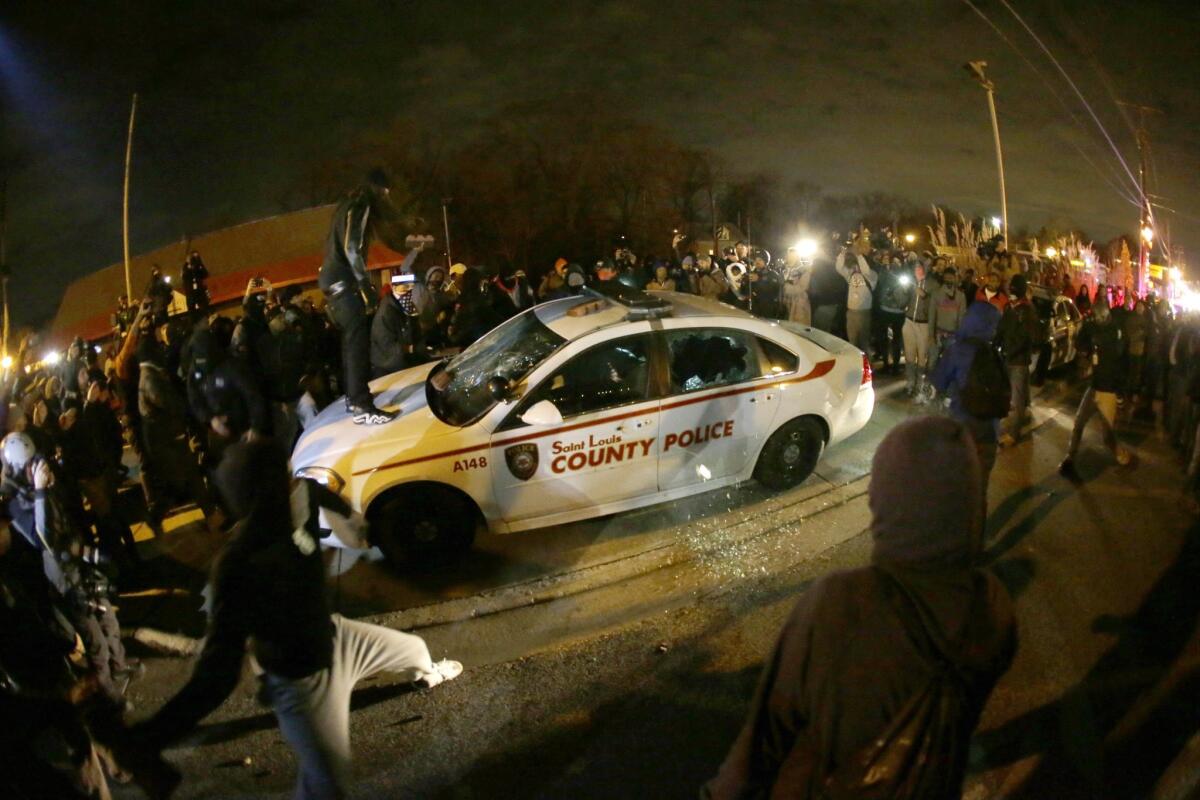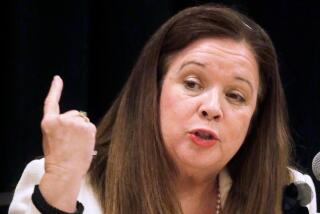Ferguson grand juror sues prosecutor for right to speak about case

A member of the grand jury that declined to indict white Ferguson, Mo., Police Officer Darren Wilson in the killing of an unarmed black man filed a federal lawsuit Monday against the prosecutor handling the case, saying the public has been misled about the grand jury’s deliberations.
Represented by the Missouri chapter of the American Civil Liberties Union, the anonymous grand juror -- identified only as “grand juror Doe” -- sued St. Louis County prosecutor Robert McCulloch for the right to speak publicly about the case.
Also Monday, a group of St. Louis-area residents filed a formal bar complaint against McCulloch, contending that prosecutors knowingly presented false testimony and violated professional rules.
The ACLU’s lawsuit marks the first time the public has heard from a juror in the case. But the lawsuit represents only the latest attack on the way grand juries are used to investigate police officers accused of using illegal force.
The grand juror hints that he or she may have voted to criminally indict Wilson and wants to advocate for reform as Missouri legislators consider whether to change the state’s grand jury process. One proposal would allow voters to decide whether to end grand juries in Missouri altogether.
Prosecutors can file charges without using grand juries, but can opt to use the juries to test their evidence or if the case is politically risky.
“We have brought this litigation because the issues underlying the grand jury process are so important to public policy debate here in St. Louis, Mo., and across the country,” Jeffrey Mittman, executive director of the ACLU Missouri, told the Los Angeles Times on Monday.
The six white men, three white women, one black man and two black women who served on the grand jury are required under Missouri law to stay silent about the inquiry into Wilson’s Aug. 9 shooting in Ferguson of Michael Brown, 18.
After months of laborious investigation and testimony, conducted by McCulloch’s office behind closed doors, the grand jury in November decided not to criminally indict Wilson for the shooting. The agreement of nine of the 12 grand jurors was required for an indictment.
The grand jury’s investigation was unusual both for its length and for the document release that followed, in which McCulloch’s office made available hundreds of pages of evidence, interviews and testimony reviewed by the grand jury.
In the proceedings -- which do not include a judge or defense attorneys -- prosecutors also took the unusual step of trying to present all the evidence neutrally, rather than presenting their best case for charges.
In the lawsuit against McCulloch, the unidentified grand juror called the prosecutors’ legal presentation of the case “muddled and untimely” compared with other grand jury investigations, in which indictments are common.
“In [the grand juror’s] view, the current information available about the grand jurors’ views is not entirely accurate -- especially the implication that all grand jurors believed that there was no support for any charges,” the lawsuit says. “Moreover, the public characterization of the grand jurors’ view of witnesses and evidence does not accord with [the grand juror’s] own.”
The grand juror took issue with prosecutors’ “insinuation” that Brown, rather than Wilson, was the “wrongdoer.”
In McCulloch’s Nov. 24 news conference announcing the grand jury’s decision, he said the jurors collectively determined there was no probable cause to indict Wilson in Brown’s death.
Probable cause is a lower legal threshold than is required to secure a conviction. Trial juries must determine whether the evidence proves guilt beyond a reasonable doubt.
McCulloch went on to summarize the evidence, criticize witnesses who gave inconsistent or false testimony and criticize the media’s coverage of the case.
A spokesman for McCulloch did not immediately respond to a request for comment Monday, but told local media that the prosecutor’s office could not comment because it had not been served with the lawsuit.
Mittman of the ACLU declined to answer questions about the grand juror and how the civil-rights organization became involved with the grand juror, citing attorney-client confidentiality and the state’s stringent orders for the grand juror not to speak about the case. The grand juror also seeks permission to speak privately about the case with family members in his or her home.
“The grand juror is very cognizant of the public policy issues at stake, and the grand juror wants to respect the instructions that were given to the grand jury,” Mittman said.
Mittman said that the typical argument for keeping grand jury proceedings secret -- to protect the reputation of the defendant -- is outweighed by free-speech interests due to the case’s intense publicity.
“I’m not aware of any time a grand juror has sued for permission to be able to talk about deliberations,” said Peter Joy, a professor of law at Washington University in St. Louis, adding, however, that “the argument isn’t a farfetched one.”
Joy told The Times the grand juror’s most “compelling” complaint was that “the prosecutor claimed to speak on behalf of the grand jury as a whole, and this particular grand juror is saying, ‘Wait a second, that’s not true, he mischaracterized the way I was thinking.’ ”
As for the bar complaint against McCulloch, a group of seven St. Louis-area residents filed it Monday with the Missouri Office of Chief Disciplinary Counsel, which investigates allegations of professional misconduct leveled against attorneys and judges.
The highly critical complaint alleges that McCulloch and the assistant prosecutors who directly handled the case improperly presented evidence, improperly presented an outdated statute to the grand jurors and knowingly entertained false testimony from at least one witness as well as Darren Wilson.
“We have sufficient reason to believe that each of these attorneys have violated a number of Missouri Rules of Professional Conduct, including the gross failure to vigorously represent their client -- the citizens,” the group wrote in the complaint.
Christi Griffin, a criminal-justice reform advocate, founder of a group called The Ethics Project and one of the seven complainants, told The Times, “We’ve reached a point where we have to demand accountability.”
A representative for the Office of Chief Disciplinary Counsel declined to comment on the group’s complaint, saying all such allegations are treated as confidential unless proven after an investigation.
Follow @MattDPearce for national news
More to Read
Sign up for Essential California
The most important California stories and recommendations in your inbox every morning.
You may occasionally receive promotional content from the Los Angeles Times.











